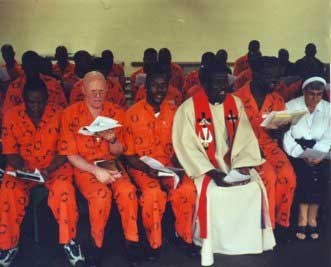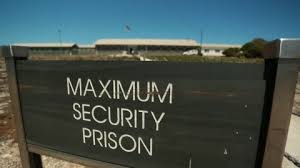Prison visitation has always been an essential part of our Mercy ministry and Sisters have met, counselled and prayed with numerous people in prisons in Pretoria, Johannesburg and, more recently, in Bethal and North West Province. Conditions have varied and still vary, often depending on the political climate, the rules and regulations of the Province within which a prison is situated or the whims of the local authorities.
During the 1980’s and 1990’s our ministry brought us into contact with political prisoners in Pretoria Central Prison, now called Correctional Services. Sister Francis Sheehy visited Patrick Lekota (now Minister of Defence) and Tom Manthata (currently a member of the Human Rights Commission in Johannesburg). The interview was monitored and conducted through a glass partition. Tom was concerned about his family: should he have married? which was more important – his family life or the struggle for freedom? At the time two of Tom’s children were attending Mercy Convent School in Mayfair.
Theresa Ramashamola was the only female member of the famous group called “The Sharpeville Six” who were found guilty of killing a local councillor. In those days there was a law which allowed for conviction if a person happened to be near the scene of a crime even if they did not take part. “Unity of purpose” was the legal jargon to justify such sentencing. Sister Gertrude Ryan and Sister Francis Sheehy both visited Theresa on death row. Francis thought she had seen Theresa for the last time but she was given a stay of execution twelve hours before she was to be hanged. Today Theresa is a free woman but living in poor circumstances and bitter because the present government has done nothing for her.
 Sr. Rita Carey and Fr. Bongi Mkhize with prisoners
Sr. Rita Carey and Fr. Bongi Mkhize with prisoners
Another political prisoner with whom the Mercy Sisters were, and still are, closely associated was Annica van Gylswijk, an Archivist working at the University of South Africa and a member of the Justice and Peace Commission of the Pretoria Diocese. During the state of emergency declared in 1986, Annica was arrested and put in solitary confinement in Pretoria Central Prison. In the words of her husband, Nick, Annica’s arrest proved that the government of the day ‘was criminalising compassion’. Possibly the authorities saw her as a danger because she had too much information from other African countries.
Very shortly after Annica’s arrest, Father Armstrong was celebrating Mass in the prison. A Wardress brought Annica to Mass. When she was being taken back to the cell, Sister Francis Sheehy, who was attending the Mass, followed (at a safe, discreet distance) to find out the number of her cell. On her next visit, she asked a young Wardress to allow her into the cell. Francis found Annica in a state of great anxiety and distress, concerned about how her husband and daughter were coping and what they thought of her. Was she doing the right thing? She was allowed a visit only from a doctor or a lawyer.
Annica was on medication but was deprived of that. She had only what she was wearing, confined to a small cell with nothing to read. Francis gave her her Sunday Missal and her handkerchief. Shortly after that, Annica was transferred to the police cells in Pretorius Street, Pretoria, where one of the tortures inflicted on her was to be put standing in dirty water and told to use it for washing herself. Sister Francis went to the police station but was refused permission to talk to Annica even when she had the Blessed Sacrament.
Eventually, Annica was given the choice of waiting six months for trial or being deported to Sweden (she is Swedish by birth). She chose the latter. Her husband followed her: this meant he had to resign from his position as a Lecturer at Pretoria University and sell their house.
The van Gylswijks have returned to South Africa and now live in Cape Town, but like Theresa, they have been, to a large extent, ignored by the government.

What about the present? Sisters Francis Sheehy and Kieran McGettrick visit the maximum security prison in Johannesburg: the entire male section and part of the female section are built underground. This prison was built by the former government: one day when one of the officials was flying over it in a helicopter, he remarked, “This is as big as Sun City” – (a gambling den and glitsy entertainment centre which deserves another chapter in South Africa’s story). The name stuck. “Sun City” is huge and very overcrowded. A dormitory in the female section, measuring 16m x 5m, is home to 38 women who are locked in from 4pm to 5am. This does not contribute to comfort or peaceful living among those confined in such cramped and inhuman conditions. The Sisters are allowed to visit for only one hour, but even though some of the women are very ill, we may not bring anything that might relieve their pain. As yet, we have not been able to get permission for a priest to say Mass occasionally: we are still trying to find a solution to this problem.
A completely different set of circumstances pertain in the North West Province where Sister Rita Carey ministers to male prisoners in three institutions. The biggest of these houses 1400 people. Sister Rita spends many hours there three days a week conducting prayer services, distributing Communion, counselling the sick and lonely, organizing classes to enable the men to further their education and making contact with families, many of whom have disowned their wayward brothers and sons.
Sister Rita is free to bring in priests to hear confessions and celebrate Mass. In addition, she supplies the prisoners with reading material and other items to help relieve the boredom of life behind bars.
On Mondays, Sister Rita visits Brits Prison which is a much smaller institution. A new venture is visitation of Losberfontein Prison, a maximum security centre where the men do farm work or building.
One of the glaring injustices in our prison system is the overcrowding: the average for the country is 65% over the accommodation provided, but in some cases the number behind bars is double the number for which the building was designed. The reason for this: many of those in prison have never been tried: many more cannot afford to pay bail which in some cases is small: others cannot afford to pay the fees of a competent lawyer. The moral of the story: the poor are always victims.
Sr. Immaculata Devine rsm
South African Province


